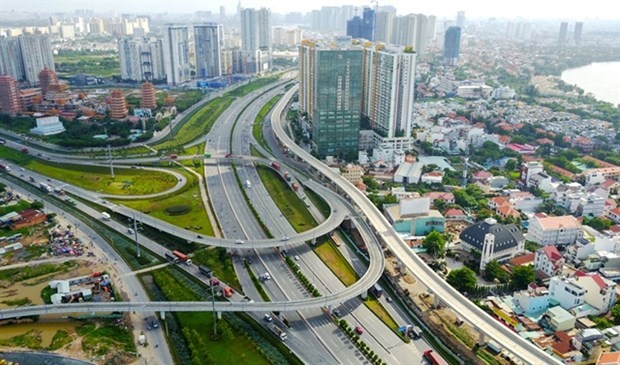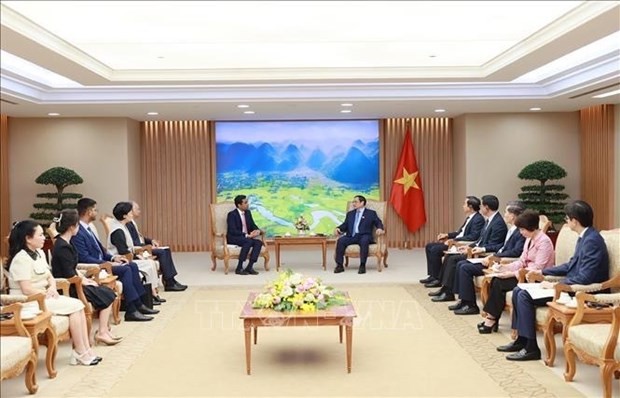 |
| View of an elevated road system in HCM City. VGP Photo |
Vietnam warmly welcomes partners, including those from India, eager to invest in infrastructure, particularly strategic infrastructure in the country, such as transportation, energy, digital, and climate-adaptive infrastructure, Prime Minister Pham Minh Chinh said to Karan Adani, CEO of the Adani Group’s Adani Ports and SEZ Limited (APSEZ), during a reception in Hanoi on May 24.
The Prime Minister informed his guest that during the recently held expanded Summit of the Group of Seven (G7) in Japan, he had a meeting with his Indian counterpart, Narendra Modi, to explore ways and means to further their comprehensive strategic partnership by promoting bilateral cooperation to its full potential.
Informing Adani about national development, he said that Vietnam is striving to attain an independent and self-reliant economy through extensive and effective global integration. This will enable the country to become a developing nation with modern industry and high-middle income by 2030, and eventually a developed nation with high income by 2045.
Vietnam is focusing on three strategic breakthroughs, namely fine-tuning institutions, developing human resources, and constructing infrastructure, the country’s leader stated.
During this process, he asserted that Vietnam has effectively mobilised and utilised all available resources to further its development. Internal resources are viewed as fundamental, strategic, long-term, and decisive, while external resources are considered to be significant, breakthrough-oriented, and regular.
 |
| At the event. Photo: VNA |
Adani Group, one of India’s leading economic conglomerates, is present in over 50 countries around the globe. Operating in various sectors such as port, transportation, logistics, energy, and digital technology, the group has become a major player in the global economy.
The group devoted time to examining possibilities in Vietnam and determined to make long-term investments in the country, not merely in port and logistics but also in energy and digital technology. Adani specifically intends to construct an environmentally friendly port ecosystem and invest in wind and solar power plants in Vietnam, with an estimated capital of around USD 10 billion, in line with Vietnam’s growth strategy, he added.
PM Chinh emphasized that Vietnam highly values Adani’s investments in sectors such as the development of Lien Chieu port in Da Nang and renewable energy projects in the country. He expressed that Vietnam is eager to welcome such investments, and that they will bring significant benefits to the nation.
Vietnam is ready to provide even more advantageous conditions for Indian companies and major conglomerates, such as Adani, to succeed in the nation, he noted.
He strongly hoped that Adani would greatly expand their investment in this field and work efficiently with Vietnamese partners to achieve tangible results.
Agreeing with the Prime Minister’s (PM) suggestions, Adani said APSEZ will work diligently to collaborate with Vietnamese stakeholders in order to launch specific projects and thus effectively promote the bilateral comprehensive strategic partnership, as expected by the PM.
The same day, an India-Vietnam multi-sectoral business interaction organized by Indian Embassy on May 25th with 20 visiting members of PHD Chamber of Commerce & Industry, Indian Business Chamber Hanoi, Hanoi Promotion Agency, Invest Global and over 100 businesspersons from Vietnam.
Representatives of companies in healthcare, renewable energy, infrastructure, electrical power, logistics, and food processing discussed trade, investment, and business collaboration opportunities between India and Vietnam. Both nations have committed to strengthening bilateral ties and cooperation in the areas mentioned above. This will open up new opportunities for businesses in both countries, and pave the way for greater economic and social progress.
|
According to estimates from the Asian Development Bank (ADB), by 2030, Vietnam’s basic infrastructure investment needs will amount to around USD 480 billion. This is a significant figure that will go a long way towards transforming the country’s economy and improving the living standards of its citizens. It is, therefore, essential that the Vietnamese government takes steps to ensure that these funds are allocated efficiently and appropriately. This could include creating a comprehensive infrastructure plan that considers both short- and long-term needs, as well as developing policies that help attract private investment. Additionally, the government should focus on improving the transparency and accountability of infrastructure projects, thereby allowing citizens to track the progress of their investment. With the help of these measures, Vietnam can ensure its infrastructure investment needs are met successfully and its citizens benefit from the improved living conditions. They lay the foundation for the development of a nation, providing essential services and facilities to its citizens. Infrastructure projects are essential for the socio-economic development of a nation. They provide essential services and facilities to citizens, particularly in the transport and industrial sectors. By spearheading these projects, a country can lay the foundation for growth and prosperity. Moreover, infrastructure projects can bring a range of benefits, such as job creation, improved connectivity, and better access to essential services. These projects can also help to create a vibrant and competitive economy, as well as boost the nation’s global standing. To speed up the process, the government of X has implemented a range of legal frameworks and policies, including the Law on Investment in the Form of Public-Private Partnerships (PPP) in 2020. This law, along with several relevant decrees and regulations, seeks to provide comprehensive guidelines and regulations on how to form public-private partnership projects. However, economists still point to numerous shortcomings and limitations. |
Painting contest held for buffaloes joining ploughing festival in Ha Nam
A buffalo painting contest for the Doi Son Tich Dien (ploughing) Festivalwas held on February 10, or the sixth day of the Lunar New Year in Doi Son commune, Duy Tien district, the northern province of Ha Nam.








